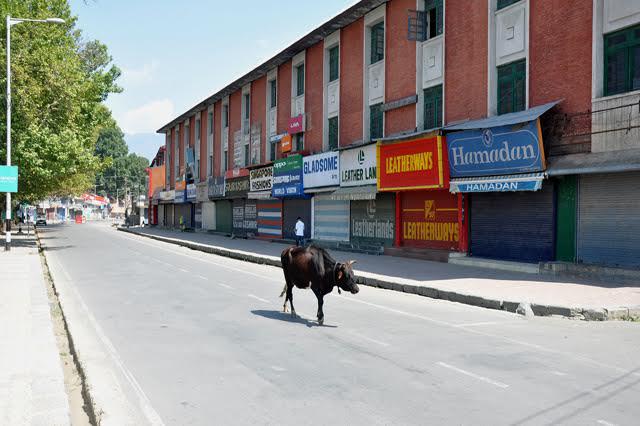Transport sector worst-hit, 5000 vehicles lying defunct
Srinagar: As Kashmir continues to remain in grip of protests, curfews, clashes and shutdowns for the past three months, its economy is consequently seeing the “worst-ever slump” with losses during this period accumulating to over Rs 10,000 crore, thus making the Valley-based traders and businessmen to be at the “receiving end” of the prevailing situation.
Kashmir-based economists and traders’ bodies put the losses incurred by Kashmir’s economy at Rs 120 crore a day on an average, thus making the total losses incurred during the past 90 days to over Rs 10,000 crore.
It all began with the killing of Hizbul Commander Burhan Wani in South Kashmir’s Anantnag (Islamabad) district on July 8 which subsequently led to massive protests during which 90 persons were killed in forces’ action. The civilian killings and massive repression on people by forces made the Valley’s joint resistance leadership to come out with protest calendars that called for continued shutdowns and marches to various places which were foiled by forces with massive force and curfews. This consequently hit the businesses in Kashmir.
While the resistance leadership called for ‘evening relaxation’ in shutdowns in its protest calendars, the overall economy continued to take a hit as, apart from grocery outlets, major business establishment remained shut. Even days before Eid-ul-Adha were marked by restrictions, shutdown and curfew.
As per mutton dealers, the sale of sacrificial animals this year saw a decline by over 80 percent which is unprecedented in Kashmir. Besides, more than 5000 marriage functions were cancelled that caused losses to these dealers.
As per market observers, transport and tourism sectors have also been the worst-hit. The government estimates put the losses incurred by tourism sector at Rs 3000 crore, while the transport sector is in suspension mode ever since July 9.
“Mostly people in Kashmir used to stock eatables by going for purchases in the morning hours when there was no protests and absence of forces on roads which allowed vegetable vendors and ‘kiryana’ shops to operate. Apart from this, there was no business activity since the eruption of uprising on July 9,” said President of Kashmir Chamber of Commerce and Industry, Mushtaq Ahmad Wani. “Kashmir‘s business community, be it big dealers or small-time vendors have shown resilience. We are witnessing the worst-ever slump but notwithstanding that, the business community is showing unflinching support to the Kashmir cause. There is no end to atrocities which is aggravating agonies of the people.”
While trade and commerce has been hit, Kashmir’s mainstay of economy, the horticulture, is also facing the brunt.
“Restrictions have crippled the horticulture sector and caused losses to it as growers and dealers are finding it difficult to export their produce to outside markets,” said Chairman of All Kashmir Valley Fruit Growers-cum-Dealers’ Union, Bashir Ahmad Basheer.
However he said the “only positive thing” during the past 90 days has been the “local produce of vegetables that proved self-sufficient to meet local demands.”
While summing up the plight of the business community during the past 90 days, Chairman of Kashmir Economic Alliance, Muhammad Yaseen Khan, said: “Kashmiri people are facing the worst kind of atrocities which are unheard of.”
“We (the business people) are part of the society, our kids are being maimed by pellets and bullets on the one hand while government is crushing our economy on the other,” he said. “Kashmir’s economy will remain vulnerable until the resolution of the Kashmir issue.”
‘TRANSPORT SECTOR WORST-HIT’
Kashmir’s public transport sector has become a worst casualty of the prevailing situation in Kashmir, with transporters stating that over 5000 vehicles in the summer capital are non-functional for the past 90 days, causing huge losses to the sector.
Since July 9, after the death of Hizb Commander Burhan Wani in an encounter in South Kashmir’s Anantnag district, public transport is completely off roads as a result of shutdown calls and restrictions imposed by the government.
This reporter visited the Batmalloo Bus Stand which is today desolate. Talking to transporters who sit idle there, they expressed their concern over non-operation of their vehicles and the losses incurred by them.
“My vehicle is lying in my lawn since July 9 and its tyres are now covered with grass as I have not even started it since then,” said Pervaiz Ahmad, a public bus driver. “Neither am I able to meet my family expenses nor pay the EMIs of my vehicle which is a cause of stress for me.”
Ahmad’s colleague Mushtaq Ahmad said other segments of the economy have been able to do some sort of business during the relaxation hours, but “ the transport sector has suffered badly.”
“Transport sector is worst affected, although losses have been recorded by all sectors. Transporters have not been able to operate even during relaxation period announced by separatists which is hurting us badly,” said Chairman of All Kashmir Passenger Mini-Bus Federation, Sheikh Muhammad Yusuf.
He said there are around 5000 public transport vehicles lying defunct since July 9. “Despite not being able to earn anything, the transporters have to pay their taxes and EMIs,” he said. “We are not earning, but our bank interests are accumulating with each passing day. Besides, there are insurance premiums, passenger taxes, token fee which are to be paid anyhow,” he said.
However, he said “we are a part of the ongoing movement and are thus backing the programs of the resistance leadership.”
“Despite the losses, we are fully endorsing the resistance leaders’ calls so that the Kashmir issue is resolved once for all and our future generations don’t suffer,” he said. (GK)

